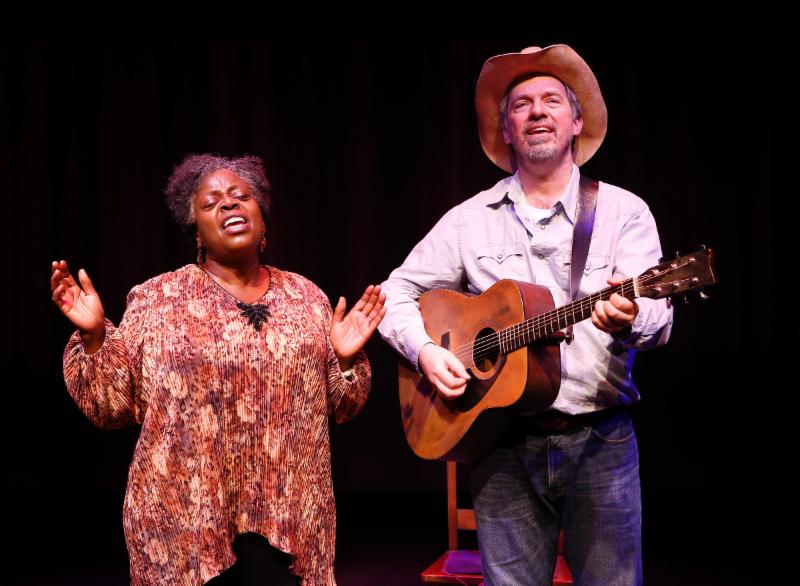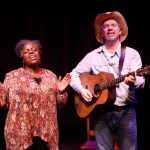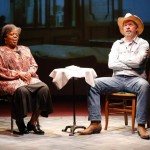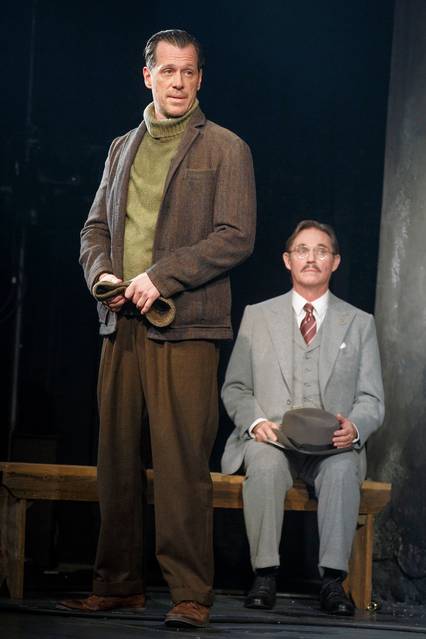Review by Samuel L. Leiter
Whether or not you can actually find a wide range of spirituals, cowboy songs, and country hymns on rural Texas jukeboxes, they’re the only selections you’ll hear in Texas in Paris, a pleasantly entertaining if dramatically sparse jukebox musical at the York Theatre Company. I say jukebox musical advisedly, since even Jim Morgan, the York’s producing artistic director (who also designed the simple, functional set), writes in the program that he’s uncertain if the show is “a musical at all, in fact.” Regardless of what kind of music’s involved, at least seventy-five percent of Texas in Paris is sung, so what else can it be but a musical, or a “musical play” as it bills itself? And since all the songs are traditional, “jukebox musical” seems as fair a description as any, even if this particular jukebox is more likely to be found in a church basement than a roadside diner.
Alan Govenar’s script, “Based on True Events,” introduces us to an aging, widowed black church lady, Osceola Mays (Lillias White), and a married redneck cowboy-farmer, John Burrus (Scott Wakefield). Both are amateur singers who have been discovered in 1989 (for some reason, the program gives 1979) and hired to give seventeen performances at Paris’s Maison des Cultures du Monde of authentic Texas music (“roots music”), one of folklorist-photographer-filmmaker Govenar’s passions. Govenar met these performers and recorded them; his show attempts to recreate their music within a context that makes it theatrically compelling. (CDs of the originals are sold in the lobby.) With the help of music supervisor Amy Jones, the lyrics and music have been “arranged” to sound as genuine as possible.
John and Osceola, both the children of sharecroppers, meet at the airport, fly to Paris, and give their concerts. Overcoming her loneliness (she talks to a doll), Osceola flourishes because she discovers a greater sense of racial equality than back home, but John, unable to adapt to change or break the rules he’s been taught, is a fish out of water, forgetting his lyrics, hating French food, and considering an early departure. They converse at iconic Paris locales, including the Metro and the Jardin de Luxembourg (seen in Jason Johnson-Spinos’s projections); she’s garrulous, he’s laconic, often restricting his comments to a simple “yep.” Although he’s not an overt racist, Mays’s frequent comments on race so discomfit him he shakes his head and rolls his eyes; eventually each completes a personal journey and learns something important about their fellow humans. These chats seem dramatically forced, but they at least provide the play with a thematic thread that creates enough interest in the characters to give weight to their singing.
The chief reason to visit Texas in Paris, of course, is the music. Most of Osceola’s songs, including such religious standards as “All God’s Children Got Shoes” and “Nobody Knows the Trouble I See,” are sung a capella, with finger snapping and hip slapping accompaniment, while John’s songs, which include cowboy classics like “Bury Me Not on the Lone Prairie,” as well as church songs like “Power in the Blood,” are accompanied by his acoustic guitar, harmonica, or, to a lesser degree, a claw hammer banjo. On a few occasions, John and Osceola sing harmony, and John briefly accompanies Osceola at one or two junctures. Osceola closes the show with a foot-stomping “When the Saints Go Marchin’ In,” and John and she follow with the uplifting “Will the Circle Be Unbroken” during the curtain call.
As directed by Akin Babatundé, both performers are completely believable in their hardscrabble characters, each with their own distinctively regional accent. They also sing perfectly well, White, with her strong gospel voice and Wakefield—wearing jeans, denim shirt, and cowboy hat—in his twangy, down-home manner.
Texas in Paris, which zips by in eighty minutes, is neither innovative nor dramatically significant. However, if you’re up for an evening of folksy, friendly Americana you should take the advice of one of John’s songs and “Git Along Little Dogies” to the York.
*Photos: Carol Rosegg
Texas in Paris
The York Theatre Company www.yorktheatre.org
The Theater at St. Peter’s
619 Lexington Avenue, NYC
Through March 1
























